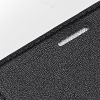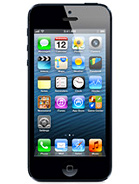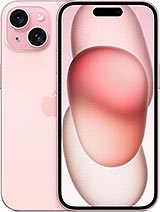To maximize your SAR comparison experience with color-coded SAR charts, please view the comparison in landscape mode. Position the top and bottom of your phone to the left and right to maximize screen size. Adding a third phone to compare is only recommended for tablets and computers with larger screens. Use the dropdown to continue.
Apple iPhone 5 vs Apple iPhone 15
- Product Name
- Product Image
-
RF Protection
Apple iPhone 5 SAR Level Summary:
The cellular transmission SAR values for the Apple iPhone 5 (FCC ID BCG-E2599A) are 1.060 W/kg (watts per kilogram) at the head and 1.18 W/kg when worn on the body. The simultaneous transmission SAR values for Apple iPhone 5 (cellular plus Wi-Fi) is 1.525 W/kg at the head, 1.546 W/kg when worn on the body, and 1.131 W/kg when used as a hotspot simultaneously with other transmitters active.
iPhone 5 Radiation Safety Accessories
Apple iPhone 15 SAR Level Summary:
The cellular transmission SAR values for the Apple iPhone 15 (FCC ID BCG-E8427A) are 1.121 W/kg (watts per kilogram) at the head and 1.088 W/kg when worn on the body. The simultaneous transmission SAR values for Apple iPhone 15 (cellular plus Wi-Fi) is 1.496 W/kg at the head, 1.444 W/kg when worn on the body, and 1.487 W/kg when used as a hotspot simultaneously with other transmitters active.
iPhone 15 Radiation Safety Accessories
RF Safe® QuantaCase iPhone 15 Anti-Radiation Phone Shield RFID Blocking Case
Original price was: $69.99.$45.47Current price is: $45.47.
General
- Apple iPhone 5Apple iPhone 15
-
Phone
Apple iPhone 5 Apple iPhone 15
-
Technology
GSM / CDMA / HSPA / EVDO / LTE GSM / CDMA / HSPA / EVDO / LTE / 5G
-
Announced
01 January 1970 12 September 2023
-
Status
Discontinued Available
-
Price
About 340 EUR C$ 999.00 / $ 610.09 / £ 619.41 / € 709.00
-
Model Names
A1428, A1429, A1442, iPhone5,1, iPhone5,2 A3090, A2846, A3089, A3092, iPhone15,4
Display
- Apple iPhone 5Apple iPhone 15
-
Type
Display Technology => A number of display technologies and types used in mobile phones => TFT (Thin Film Transistor), IPS (In-Place Switching), OLED (Organic Light Emitting Diode), AMOLED (Active-Matrix Organic Light-Emitting Diode), Super AMOLED (an even advanced version of AMOLED), Resistive Touchscreen (Resistive touchscreens contain two layer of conductive material with a very small gap between them which acts as a resistance), Capacitive Touchsceen (Capacitive touchscreen technology consists of a layer of glass coated with a transparent conductor) IPS LCD Super Retina XDR OLED, HDR10, Dolby Vision, 1000 nits (HBM), 2000 nits (peak)
-
Size
4.0 inches, 44.1 cm2 (~60.8% screen-to-body ratio) 6.1 inches, 91.3 cm2 (~86.4% screen-to-body ratio)
-
Resolution
640 x 1136 pixels, 16:9 ratio (~326 ppi density) 1179 x 2556 pixels, 19.5:9 ratio (~461 ppi density)
-
Protection
Display Protection => Gorilla Glass is a special alkali-aluminosilicate glass shield with exceptional damage resistance that helps protect mobile displays from scratches, drops, and bumps of everyday use, It is always better to go for a smartphone with Gorilla Glass for that added protection and peace of mind. Corning Gorilla Glass, oleophobic coating Ceramic Shield glass
-
Features
Corning Gorilla Glass, oleophobic coating
-
Display Test
Contrast ratio: 1320:1 (nominal) / 3.997:1 (sunlight) Contrast ratio: Infinite (nominal)
Camera
- Apple iPhone 5Apple iPhone 15
-
Main Camera
Camera is able to capture photographs and usually videos, The most important characteristics of a camera are the resolution (measured in megapixels), lens focus type (fixed or automatic), higher megapixel cameras are known to capture higher quality photos, but not always a good measurement of the photos quality. Single Camera: 8 MP, f/2.4, 33mm (standard), 1/3.2", 1.4m, AF Dual Camera: 48 MP, f/1.6, 26mm (wide), 1/1.56", 1.0m, dual pixel PDAF, sensor-shift OIS
12 MP, f/2.4, 13mm, 120 (ultrawide) -
Main Features
LED flash, panorama, HDR Dual-LED dual-tone flash, HDR (photo/panorama)
-
Video
1080p@30fps 4K@24/25/30/60fps, 1080p@25/30/60/120/240fps, HDR, Dolby Vision HDR (up to 60fps), Cinematic mode (4K@30fps), stereo sound rec.
-
Selfie Camera
Single Camera: 1.2 MP, f/2.4, 35mm (standard) Single Camera: 12 MP, f/1.9, 23mm (wide), 1/3.6", PDAF
SL 3D, (depth/biometrics sensor) -
Selfie Camera Features
face detection, FaceTime over Wi-Fi or Cellular HDR, Cinematic mode (4K@30fps)
-
Selfie Camera Video
720p@30fps 4K@24/25/30/60fps, 1080p@25/30/60/120fps, gyro-EIS
Battery
- Apple iPhone 5Apple iPhone 15
-
Type
Battery Type => Cell phones run on various kinds of batteries depending on the manufacturer, phone size or shape and features. There are basically four types of cell phone batteries => Lithium Polymer, Lithium Ion, Nickel Metal Hydride and Nickel Cadmium. Li-Po 1440 mAh, non-removable (5.45 Wh) Li-Ion 3349 mAh, non-removable
-
Battery Test
Battery Capacity is a measure (typically in Amp-hr) of the charge stored by the battery, and is determined by the mass of active material contained in the battery. The battery capacity represents the maximum amount of energy that can be extracted from the battery under certain conditions. Endurance rating 51h
-
Charging
Wired, PD2.0, 50% in 30 min (advertised)
15W wireless (MagSafe)
15W wireless (Qi2) - requires iOS 17.2 update
4.5W reverse wired
Hardware
- Apple iPhone 5Apple iPhone 15
-
Operating System
iOS 6, upgradable to iOS 10.3.4 iOS 17, upgradable to iOS 17.5.1, planned upgrade to iOS 18
-
Chipset
Chipset is a group of integrated circuits designed to perform one or a more dedicated functions, often with real time computing constraints, Popular smartphones are equipped with more advanced embedded chipsets that can do many different tasks depending on their programming. Apple A6 (32 nm) Apple A16 Bionic (4 nm)
-
CPU
CPU (Central Processing Unit) mostly known as processors, CPU processes instructions in order to carry out certain functions that make your device operate properly. Processors are often described as the brain of computers, smartphones and tablets, Smartphones and tablets rely on processors to carry out their every task, Processors are an incredibly important factor in selecting any type of computing device, including your smartphone. Dual-core 1.3 GHz Swift (ARM v7-based) Hexa-core (2x3.46 GHz Everest + 4x2.02 GHz Sawtooth)
-
GPU
GPU (Graphics Processing Unit) is a single-chip processor designed to rapidly manipulate and alter memory to accelerate the creation of images in a frame buffer intended for output to a display, This includes things such as lighting effects, object transformations, and 3D motion. PowerVR SGX 543MP3 (triple-core graphics) Apple GPU (5-core graphics)
-
Performance
Basemark X: 2229 AnTuTu: 1354651 (v10)
GeekBench: 6526 (v6)
GFXBench: 60fps (ES 3.1 onscreen) -
Internal Storage
Internal Storage is a data storage space (flash memory) mostly used in smartphones, tablets and other electronic devices where operating system, apps, music, photos, videos, files and other user data Is stored. 16GB 1GB RAM, 32GB 1GB RAM, 64GB 1GB RAM 128GB 6GB RAM, 256GB 6GB RAM, 512GB 6GB RAM
NVMe -
Card Slot
Memory Card Slot is a special slot for inserting a memory card. Memory cards allow you to expand the phone's built-in memory, A memory card (sometimes called a flash memory card or a storage card) is a small storage medium used to store data such as text, pictures, audio, and video, for use on small, portable or remote computing devices such as mobile phones, mp3 players, digital cameras. No No
-
Sensors
Sensors are electronic components that detects and responds to some type of input from the physical environment. The specific input could be light, heat, motion, moisture, pressure and location, The output is generally a signal that is converted to use in computing systems, a location sensor, such as a GPS receiver is able to detect current location of your electronic device. Accelerometer, gyro, proximity, compass Face ID, accelerometer, gyro, proximity, compass, barometer
Ultra Wideband (UWB) support (gen2 chip)
Emergency SOS via satellite (SMS sending/receiving)
Connectivity
- Apple iPhone 5Apple iPhone 15
-
Wi-fi
Wi-Fi is a popular wireless networking technology using radio waves to provide high-speed network connections that allows devices to communicate without cords or cables, Wi-Fi is increasingly becoming the preferred mode of internet connectivity all over the world. Wi-Fi 802.11 a/b/g/n, dual-band, hotspot Wi-Fi 802.11 a/b/g/n/ac/6, dual-band, hotspot
-
Bluetooth
Bluetooth is a wireless communications technology for exchanging data between mobile phones, headsets, computers and other network devices over short distances without wires, Bluetooth technology was primarily designed to support simple wireless networking of personal consumer devices. 4.0, A2DP, LE 5.3, A2DP, LE
-
USB
Lightning, USB 2.0 USB Type-C 2.0, DisplayPort
-
GPS
GPS The Global Positioning System is a satellite-based radio navigation system, GPS permits users to determine their position, velocity and the time 24 hours a day, in all weather, anywhere in the world, In order to locate your position, your device or GPS receiver must have a clear view of the sky. GPS, A-GPS, GLONASS GPS, GLONASS, GALILEO, BDS, QZSS
-
NFC
NFC (Near field communication) is a set of standards for smartphones and similar devices to establish peer-to-peer radio communications with each other by touching them together or bringing them into proximity, usually no more than a few inches. Yes
-
Radio
No No
Sound
- Apple iPhone 5Apple iPhone 15
-
Loudspeaker
Yes Yes, with stereo speakers
-
3.5mm Jack
Yes No
-
Loudspeaker Test
Voice 66dB / Noise 66dB / Ring 67dB -26.2 LUFS (Good)
Design
- Apple iPhone 5Apple iPhone 15
-
Type
Design Type called form factor refers to a mobile phone's size, shape, and style as well as the layout and position of major components of phone. There are three major form factors seen in mobile phones => bar phones, folding phones and sliding phones. Bar Bar
-
Dimensions
123.8 x 58.6 x 7.6 mm (4.87 x 2.31 x 0.30 in) 147.6 x 71.6 x 7.8 mm (5.81 x 2.82 x 0.31 in)
-
Weight
112 g (3.95 oz) 171 g (6.03 oz)
-
Colors
Black/Slate, White/Silver Black, Blue, Green, Yellow, Pink
-
Build
Glass front (Corning-made glass), aluminum back, aluminum frame Glass front (Corning-made glass), glass back (Corning-made glass), aluminum frame
Network
- Apple iPhone 5Apple iPhone 15
-
Speed
HSPA 42.2/5.76 Mbps, LTE Cat3 100/50 Mbps, EV-DO Rev.A 3.1 Mbps HSPA, LTE, 5G, EV-DO Rev.A 3.1 Mbps
-
SIM
SIM (Subscriber Identity Module) is a small card that contains mobile network subscriber's account information. This allows the phone using the card to attach to a mobile network. The SIM card is most commonly associated with GSM and UMTS mobile networks. Moving a SIM card from one phone to another allows a subscriber to switch mobile phones without having to contact their mobile network carrier. SIM cards can also be used by a phone to store limited amounts of data, such as phone numbers and text messages. Nano-SIM Nano-SIM and eSIM - International Dual eSIM with multiple numbers - USA Dual SIM (Nano-SIM, dual stand-by) - China
IP68 dust/water resistant (up to 6m for 30 min)
Apple Pay (Visa, MasterCard, AMEX certified) -
2G Network
GSM 850 / 900 / 1800 / 1900 - GSM A1428
CDMA 800 / 1900 / 2100 - CDMA A1429 GSM 850 / 900 / 1800 / 1900 - SIM 1 & SIM 2 (dual-SIM)
CDMA 800 / 1900 -
3G Network
HSDPA 850 / 900 / 1700 / 1900 / 2100 - GSM A1428
CDMA2000 1xEV-DO - CDMA A1429 HSDPA 850 / 900 / 1700(AWS) / 1900 / 2100
CDMA2000 1xEV-DO -
4G Network
4, 17 - GSM A1428
LTE 700 / 850 / 1800 / 1900 / 2100 - CDMA A1429
LTE 850 / 1800 / 2100 - GSM A1429 1, 2, 3, 4, 5, 7, 8, 12, 13, 17, 18, 19, 20, 25, 26, 28, 30, 32, 34, 38, 39, 40, 41, 42, 46, 48, 53, 66 - A3090
1, 2, 3, 4, 5, 7, 8, 12, 13, 14, 17, 18, 19, 20, 25, 26, 28, 29, 30, 32, 34, 38, 39, 40, 41, 42, 46, 48, 53, 66, 71 - A2846
1, 2, 3, 4, 5, 7, 8, 11, 12, 13, 14, 17, 18, 19, 20, 21, 25, 26, 28, 29, 30, 32, 34, 38, 39, 40, 41, 42, 46, 48, 53, 66, 71 - A3089
1, 2, 3, 4, 5, 7, 8, 12, 13, 17, 18, 19, 20, 25, 26, 28, 30, 32, 34, 38, 39, 40, 41, 42, 46, 48, 66 - A3092 -
5G Network
1, 2, 3, 5, 7, 8, 12, 20, 25, 26, 28, 30, 38, 40, 41, 48, 53, 66, 70, 77, 78, 79 SA/NSA/Sub6 - A3090
1, 2, 3, 5, 7, 8, 12, 14, 20, 25, 26, 28, 29, 30, 38, 40, 41, 48, 53, 66, 70, 71, 77, 78, 79, 258, 260, 261 SA/NSA/Sub6/mmWave - A2846
1, 2, 3, 5, 7, 8, 12, 14, 20, 25, 26, 28, 29, 30, 38, 40, 41, 48, 53, 66, 70, 71, 75, 76, 77, 78, 79 SA/NSA/Sub6 - A3089
1, 2, 3, 5, 7, 8, 12, 20, 25, 26, 28, 30, 38, 40, 41, 48, 66, 70, 77, 78, 79 SA/NSA/Sub6 - A3092
FCC SAR Levels
- Apple iPhone 5Apple iPhone 15
-
FCC Approval Date
This is the date the phone SAR test was completed before the phone's release to the public as required by law. 23 September 2012 06 September 2023
-
FCC ID
The FCC ID is the code used to register a device for FCC compliance BCG-E2599A BCG-E8427A
- FCC Report Link A direct link to the FCC's website for confirming SAR levels that are listed on our website - We did the homework for you!
-
US SAR Ratings
USA Legal Limit is 1.6 W/kg USA Legal Limit is 1.6 W/kg - FCC SAR testing is measured in watts per kilogram (or W/kg) averaged over ONE gram of simulated biological tissue.
-
Head SAR Level
SAR test when held against your head when only using cellular service. Wifi and other transmitter are NOT active 1.060 W/kg 1.121 W/kg
-
Body SAR Level
SAR test when held against your body only using cellular service. Wifi and other transmitter are NOT active 1.18 W/kg 1.088 W/kg
-
Product Specific Use
SAR test when held against your body only using the phone as a hotspot. Cellular and other transmitter are NOT active 0.977 W/kg 1.136 W/kg
-
Simultaneous Transmission
The highest possible SAR recorded with ALL transmitters active, Cellular, WiFi, and Hotspot 1.598 W/kg 1.496 W/kg
-
Simultaneous Head
The highest possible SAR test when held against your HEAD with cellular and WiFi transmitters active, 1.525 W/kg 1.496 W/kg
-
Simultaneous Body
The highest possible SAR test when held against your BODY with cellular and WiFi transmitters active, 1.546 W/kg 1.444 W/kg
-
Hotspot SAR
The highest possible SAR test when held against your BODY using the phone as a hotspot with cellular and WiFi transmitters active, 1.131 W/kg 1.487 W/kg
EU SAR Level
- Apple iPhone 5Apple iPhone 15
-
EU SAR Ratings
EU Legal Limit is 2.0 W/kg EU Legal Limit is 2.0 W/kg
-
Head SAR Level
0.95 W/kg (head) 0.98 W/kg (head)
-
Body SAR Level
0.90 W/kg (body) 0.98 W/kg (body)


